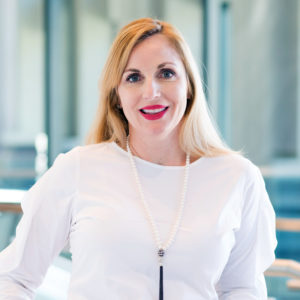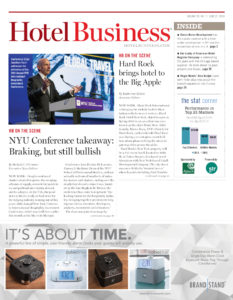TLANTA—Growth and evolution in some way, shape or form is the goal of most companies, but with that comes some difficulties: How can a company adapt and change while still retaining the culture that made it successful in the first place—especially in an environment where what’s important in the workplace is also evolving?
That’s a question that Atlanta-based Hospitality Ventures Management Group (HVMG) has spent a lot of time on this year. Sue Sanders, HVMG’s SVP of strategic planning & chief human resources officer, said that the company’s vision is to be the most sought-after employer, operator and partner in the hotel industry and HVMG accomplishes that, in part, by creating a culture of excellence in each of its stakeholders.
“That’s always been our vision, but what changed this year is the focus,” she said, adding that the excellence culture starts with a mindset, and continues with how the company hires, trains and works day in and out. “But why do we want to be excellent? We kept asking that, and what we finally got to was this: We want those whom we’re in relationships with—our associates, our guests and our partners—to love us. Not like us. When that phrase got up on the flip chart, everyone in the room felt the energy and the enthusiasm around that.”
The question, Sanders explained, was how to bottle that enthusiasm for the rest of the organization: Will they be as excited about it? Is it as believable to them? “If we can do that, we should achieve our vision,” she said.
HVMG used its company leadership conference earlier this year to implement this new strategy. “We brought 120 leaders in from across the country,” reported Sanders. After the usual presentations about HVMG’s strategic plan, the group broke out into innovation sessions. It was important to the management firm that the sessions not just focus on the low-hanging fruit of solving guest problems the leaders dealt with everyday, but also on bigger-picture issues. “What are some of their ideas on how they would increase total company growth?” Sanders asked, noting that the innovation sessions all had to do with major company goals. “Our thinking evolved much more—not that we were ever exclusive—and we included everyone with our approach, going through the process of innovation.”
She continued, “We posed challenges, one in each of five different sessions; they were ideation sessions to get out of the company leaders the things they would do to achieve these different goals for portfolio growth, total revenue, flow/flex, guest excellence, and how we get the associates to live our purpose. We had hundreds of great ideas for each problem, and quick wins have come out of that. Some things have already changed.”
For example, in the portfolio revenue session, someone brainstormed that food trucks are popular, which is in line with HVMG’s focus on F&B, so why not take a food truck to a client? “Someone did it,” she reported. “They went to visit a top client with a food truck, and basically entertained everyone in the office at the work site.
“That’s just one idea, but what we’ve learned about innovation is you can’t just talk about it. You can’t set them in front of a speaker or just train them on it. They have got to experience it,” continued Sanders. “How do we get them to be hands-on, solving real problems?”
HVMG also wanted to continue those conversations after the conference to help keep employees from being stuck in silos and to have them build relations. “We’ve supported them with a technology platform, a web-based way where anyone—there’s not a certain level of administration—can pose challenges to either everyone or a specific group,” she said. “It’s really this open forum for ideation, idea sharing and problem solving. It’s so cool because there’s visibility to it. They were excited about what they learned at the conference, and using the tool has been a natural thing for everyone.”
This evolution also comes at a time of expansion for the company, as HVMG has steered its direction to focus on expanding its full-service offerings. “The hotels we’ve been taking on have been larger boxes with F&B operations and more meeting space, and in some cases, convention space attached,” said Sanders. As such, HVMG has focused on beefing up its F&B, revenue management and property management divisions. “We’re helping to develop F&B concepts,” she said. “As a company, we want to be known for food & beverage innovation; we’ve put a lot of resources into that area in terms of talent.”
As for project management, HVMG has “a couple of renovations right now that are more than $10 million,” Sanders reported, “and more in the pipeline. In total, it’s about $100 million in renovations in the pipeline. We’ve gone after the bigger products and grown our internal capabilities to meet what’s needed to be able to deliver the same results we’re known for, even in these bigger hotels.”
Sanders also noted that when asked who does revenue management the best, most owners have indicated that while many companies are good, no one stands out. “If someone could figure that out, it would be a game-changer. We’ve put a lot of resources in that area,” she said, noting that the company has brought in several revenue management veterans who are “turning our whole approach to this on its side. We already were good, but it’s taking us to another level. I’m not saying it’s going to happen overnight, but we aspire to be that company that does stand out.”
So as the company has grown in size and added new employees, how has it managed to retain its culture? “It definitely is a balance,” said Sanders. The first key is feedback. “ We constantly seek active feedback. It’s going out, doing web-based surveys, hiring a third party to interview owners, brands and GMs and pull information together for us around what makes us unique. We are constantly seeking input from all kinds of stakeholders and weaving that into our planning processes.” Just as important, she said, is letting those people know their input is being implemented.
The second key, said Sanders, “is hiring for your culture so as you grow, you retain it. If it’s a new location, it’s putting in and promoting as many current employees who embody the excellence culture as possible,” she said. “When we’re hiring, it’s assessing culture [fit].”
And, of course, it’s adapting to changing times. “We’ve done things like add more sick time, add more holidays to give people more time with families, enhance our PTO vacation policy,” said Sanders.
“At corporate, without the 24/7 nature of the hotel, there definitely are differences here to make it a work environment that evolves with the world. The traditional ‘come in at 8 a.m. and leave at 5 p.m.’ office environment doesn’t really exist today,” she continued, referencing Atlanta’s well-known traffic jams. “We’ve had to be flexible with when people need to be in the office—for instance, maybe they can come in at 7 a.m. and leave at 4 p.m. Does their job even require that they have to be in every day? Can they work from home a couple days a week? We don’t do a blanket policy—it’s case by case [depending on job requirements]—but we’re flexible and listen to the needs.”
And the company is even changing how it’s physically structured, initiating the planning stages of a Millennial-mindset renovation of its corporate offices. “It’ll be a combination of open space—communal tables, large and small conference rooms, phone booths, cubes, offices and then some play space,” said Sanders. “As we’ve recruited the last few years, the questions you’re asked now are different. We get so many questions about what the office environment is like. Three years ago, no one asked questions like that. We pay attention to that.” HB


